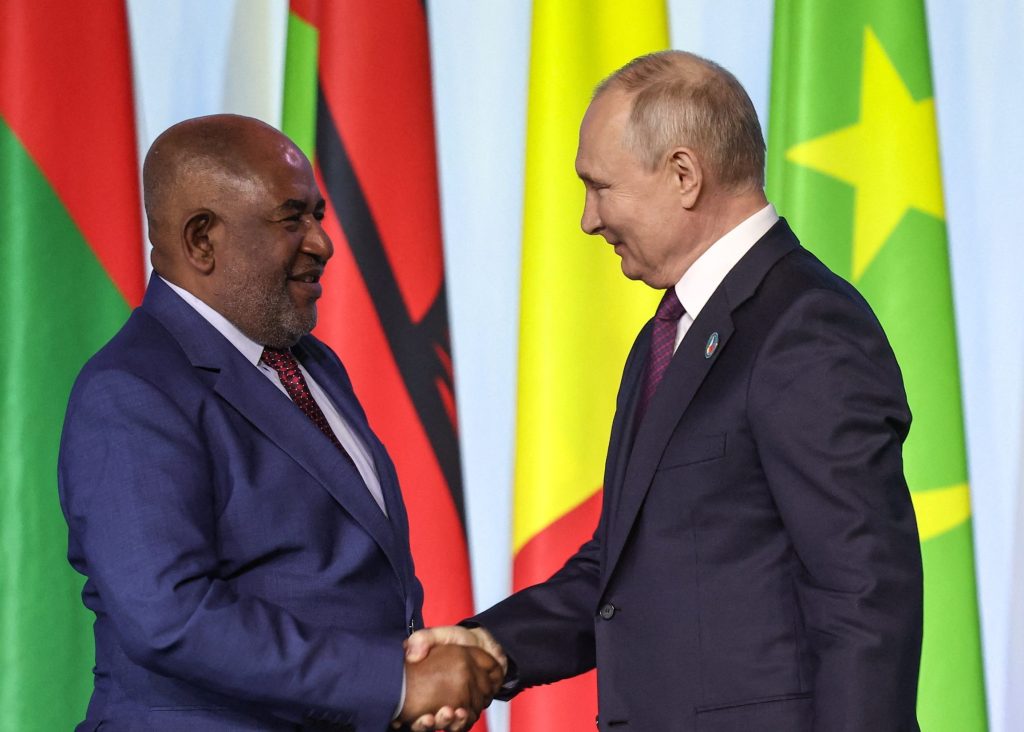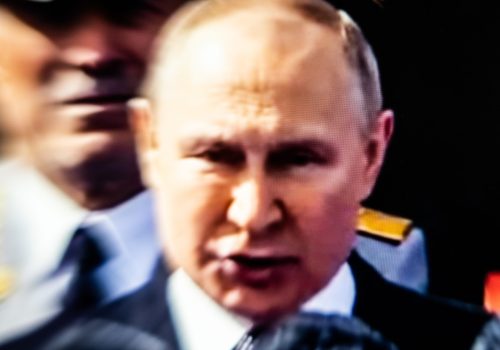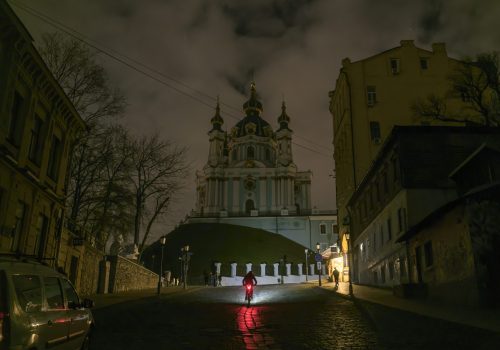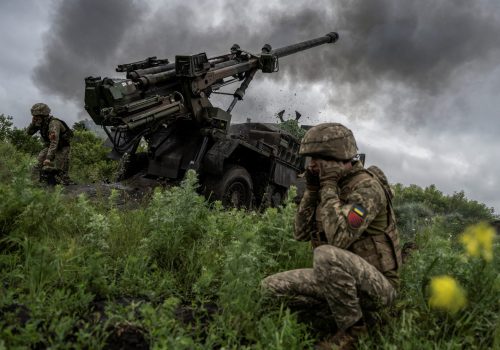The full-scale Russian invasion of Ukraine has transformed the geopolitical landscape and led to a near complete rupture in the already rocky relationship between Moscow and the Western world. The Kremlin has sought to compensate for this loss by strengthening economic, security, and diplomatic ties with the Global South.
In an apparent bid to provide an ideological basis for this enforced pivot away from the West, Vladimir Putin has sought to promote Russia as the leader of a global anti-colonial movement. This cynical move echoes earlier Soviet propaganda positioning the USSR as an enemy of Western imperialism. Crucially, it also whitewashes Russia’s long history of colonial expansion while conveniently ignoring the openly imperialistic war being waged by the Putin regime in Ukraine.
Putin first championed Russia’s anti-colonial credentials during a September 2022 ceremony marking the “annexation” of four partially occupied Ukrainian provinces. At one point in his address, the Russian leader spoke specifically of ending US hegemony through an “anti-colonial movement” to be led by Moscow.
He has continued to promote this anti-colonial narrative ever since. At a September 2023 forum in Vladivostok, Putin stated that Russia had “never been a colonizer anywhere.” One month later, he told an international audience at the annual Valdai Discussion Club that “the era of colonial rule” was long over, before accusing the West of robbing the entire planet. “The history of the West is essentially a chronicle of endless expansion,” Putin declared without a hint of irony, despite ruling over what is by far the world’s largest country thanks to centuries of relentless imperial expansion.
Stay updated
As the world watches the Russian invasion of Ukraine unfold, UkraineAlert delivers the best Atlantic Council expert insight and analysis on Ukraine twice a week directly to your inbox.
Anybody with a basic knowledge of Russian history will recognize the absurdity of Putin’s efforts to portray his country as an ideological opponent of imperialism. Modern Russia includes vast territories conquered from the fifteenth century onward. During the Tsarist era, imperial Russia swallowed up numerous non-Russian nations and incorporated much of the northern Eurasian landmass, eventually reaching the Pacific Ocean.
Expansion into Siberia and the Caucasus provided generations of Russian rulers with access to valuable resources including oil, gas, gold, diamonds, timber, and much more. These natural treasures have been a primary source of Russia’s wealth for hundreds of years, representing a textbook example of colonial exploitation.
While the Russian imperial elite has enriched itself, the non-Russian peoples of the empire have received very little in exchange for the plunder of their natural resources. Indeed, these non-Russian regions remain among the poorest and most deprived areas of today’s Russian Federation. Putin has exploited this marginalization, recruiting disproportionately large numbers of soldiers from these regions for his invasion of Ukraine.
The hypocrisy of Putin’s anti-colonial posturing is most immediately apparent in relation to Russia’s ongoing war in Ukraine. He has publicly compared the invasion of Ukraine to Russian Tsar Peter the Great’s eighteenth century wars of imperial conquest, and appears unperturbed by the obvious contradictions between this openly imperialistic behavior and his professed opposition to “Western colonialism.” In Putin’s dystopian world, of course, Russia is fighting to liberate Ukrainians from the nefarious influence of the West.
Eurasia Center events

Putin’s brand of anti-colonialism echoes Soviet narratives that first emerged in the aftermath of the Bolshevik Revolution before evolving further during the Cold War. Soviet anti-colonial propaganda initially focused on criticism of Tsarist imperialism and support for the oppressed nations of the old Russian Empire. However, this changed once Stalin assumed power in the late 1920s. During the following decades, the Stalinist regime rehabilitated the imperial nationalism of the Tsarist era. Soviet textbooks even asserted that non-Russians had voluntarily chosen to join the Russian Empire.
The advent of the Cold War led to a major surge in Soviet anti-colonial propaganda, with the Communist authorities actively backing the liberation movements which swept Africa and Asia in the decades following World War II. Throughout the past year, Putin has repeatedly sought to highlight this history of Soviet support for countries seeking to shake off Western colonial rule, particularly when addressing African leaders.
Putin’s anti-colonial aspirations also reflect modern Russia’s failure to undertake a critical introspection of Tsarist and Soviet imperialism. During the three decades since the fall of the USSR, there has been almost no effort to examine the Kremlin’s colonial policies toward the many non-Russian peoples subjected to centuries of imperial rule. Instead, Russia’s state archives have largely remained closed, while Moscow has refused to embrace the kind of decolonization policies witnessed in independent Ukraine, the Baltic states, and some other former Soviet republics.
Since Putin came to power at the turn of the millennium, Russia has rehabilitated the ideology of imperialism while glorifying the Tsarist and Soviet empires, with a steady stream of films, TV serials, literature, and school textbooks celebrating and reinforcing Russia’s imperial identity. Meanwhile, crimes against the non-Russian peoples of the empire, such as the genocidal Holodomor famine that killed millions of Ukrainians in the early 1930s, have been whitewashed or erased entirely from official histories.
Surprisingly, the reluctance of modern Russia to confront the country’s imperial past has been mirrored by many Western academics and commentators, who have continued to overlook the issue of Russian colonialism despite the troubling imperialistic instincts of the Putin regime. Western histories of Russia still often follow the template established by the Kremlin and include references to “one thousand years of Russian history,” without acknowledging Ukraine’s own rival claim to the legacy of the medieval Kyivan Rus state.
Putin’s bid to position Russia as the world’s leading anti-colonial power is more than just geopolitical opportunism brought on by the necessity of frayed relations with the West. It is the culmination of decades of Tsarist, Soviet, and post-Soviet indoctrination that has excused Russian colonialism towards Ukrainians and other non-Russian peoples, while conflating Russia’s own anti-Western xenophobia with broader opposition to the dominant role of the West in global affairs.
The countries of the Global South may have many good reasons for pursuing closer ties with Putin’s Russia, but a shared opposition to imperialism is most certainly not one of them. On the contrary, if anti-imperial sentiment in the Global South has any impact on attitudes toward the Russian invasion of Ukraine, it should logically fuel support for Ukraine’s fight against Russian imperialism.
Taras Kuzio is a professor of political science at the National University of Kyiv Mohyla Academy and an associate research fellow at the Henry Jackson Society. He is the winner of the 2022 Peterson Literary Prize for the book “Russian Nationalism and the Russian-Ukrainian War: Autocracy-Orthodoxy-Nationality.”
Further reading
The views expressed in UkraineAlert are solely those of the authors and do not necessarily reflect the views of the Atlantic Council, its staff, or its supporters.

The Eurasia Center’s mission is to enhance transatlantic cooperation in promoting stability, democratic values and prosperity in Eurasia, from Eastern Europe and Turkey in the West to the Caucasus, Russia and Central Asia in the East.
Follow us on social media
and support our work
Image: Russian President Vladimir Putin and Comoros President Azali Assoumani, the chair of the African Union, shake hands during a join briefing for media at a the final day of the Russia-Africa summit in Saint Petersburg. July 28, 2023. (Valery Sharifulin/TASS Host Photo Agency via REUTERS)




